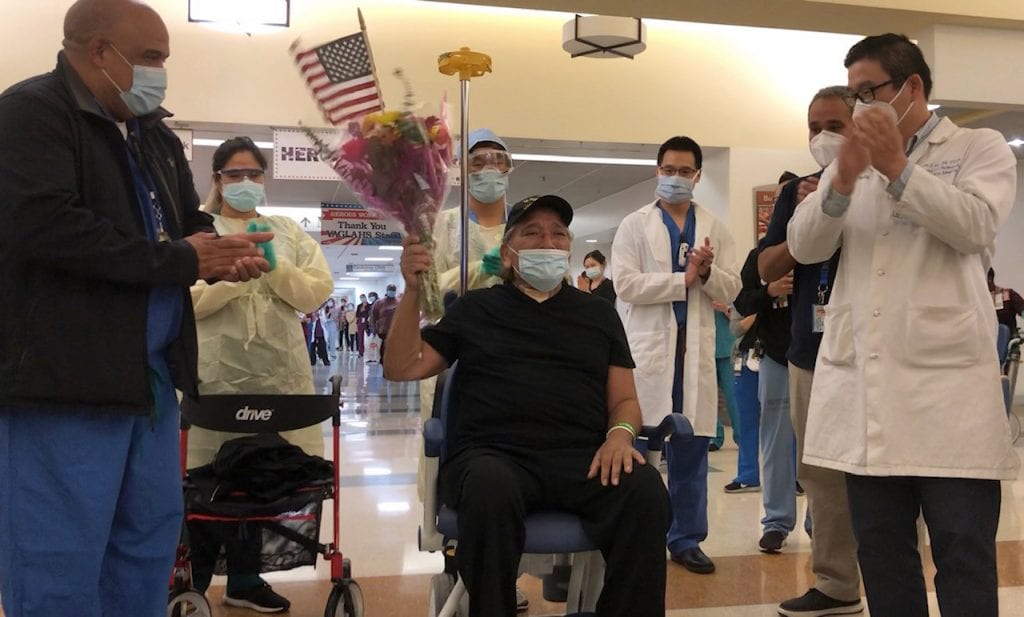
Jerry Salas, 68-year-old Army Veteran, receives a congratulatory sendoff from his healthcare providers as he is discharged from the main hospital at VA Greater Los Angeles Healthcare System’s West Los Angeles campus, on May 15, 2020. Salas was admitted to the VAGLAHS’ hospital on March 29, 2020 after contracting the Novel Coronavirus and falling severely ill.
PRESS RELEASE
LOS ANGELES – The steady beep of the ventilator is all that can be heard in Jerry Salas’ otherwise quite hospital room. When he left Vietnam 49 years ago, the 68-year-old Army Veteran couldn’t have anticipated facing this type of enemy. A series of machines anchor his listless body to this world as the Novel Coronavirus (COVID-19) wreaks havoc through his body. Outside his room, staff from the VA Greater Los Angeles Healthcare System’s (VAGLAHS) West Los Angeles (WLA) campus grapple with a question: what is the best way forward? They’ve given their all, but Salas’ prognosis has only gotten worse. Despite everything, it looks like they will lose him, too.
But, on May 15, 2020, a boom of applause is all that can be heard in the first-floor lobby as Salas moves past the rows of joyous, tear-filled people who helped bring him back from the brink. The air is charged with emotion as living proof of devotion to self and others makes his way triumphantly down the hall and out the door.
Symphony in the Making
Since before he was born, Jerry Salas has had harmony running through his veins. His father, brother and uncle were all blessed with musical talent and between the three of them, Salas was exposed to a wide range of melodies; genres like Country Western, Hawaiian, Mariachi, Rock and Roll, R&B and Jazz melded together to form his foundation.
“My father was a professional guitar player and singer, my uncle was an amazing singer, and my brother could play guitar and sing like you wouldn’t believe,” Salas said. “As I was growing up, I would sit and listen to them and I would just be amazed. I wanted to learn too.”
By the age of 10, Salas was already familiar with the guitar and by the time he was 15 years old he and his brother were playing shows up and down the Sunset Strip. This would persist until early 1971, when he was drafted to the Vietnam War for what turned out to be a year-long deployment. He didn’t know it then, but it would be his love of music that carried him through.
“When I was in Vietnam, I drove armored personnel carriers for the first five and a half months. But I always carried my guitar with me, and I’d play for the guys when I could,” Salas said. “One day a major walked in and heard me playing. The next morning there was a master sergeant waking me up. He said ‘I hear you play guitar. You want to get out of the bush and come to special services?’”
For the remainder of his time there, Salas was flown all over Vietnam to play shows for the troops. “It was an amazing experience being able to entertain the troops,” Salas said. “It was just me and a bass player, so they were able to take us to different places that were way in the bush, and we’d boost the morale of the men there.”
At some point during his deployment, there was a mass reduction in the armed forces and those who had been in Vietnam more than six months could go home. Salas fit the bill and when he arrived state-side he received more good news; the Army was allowing draftees who’d served at least one year to end their service with full benefits and an honorable discharge. “God was looking out for me,” Salas said of his early separation from the armed forces.
Just one year after Salas’ return from Vietnam, he joined the chart-topping Los Angeles based band El Chicano as their lead singer. And he’s remained an integral part of their sound and success for 47 years. For the duration of his time with El Chicano, Salas has contributed to the making of 10 albums and he’s received the opportunity to tour with artists like Earth, Wind and Fire, The Jacksons, Rod Steward and ZZ Top to name a few.
“On the first album that I made with the band, we had a hit song called Tell Her She’s Lovely,” Salas said. “It made top 40 on the U.S. charts and from there it was album after album, tour after tour. Our fan base is just a potpourri of people. Either they’ve been following us, or they’ve handed it down to their kids, but they keep coming back so we’re going to keep playing.”
In retrospect, Salas believes that this passion for music is part of what landed him at VAGLAHS’ WLA facility with COVID-19. “I did a concert a week before I came in, which I probably shouldn’t have done. There were about 5,000 people there and a week later I was in the hospital,” Salas said. “I was the most vulnerable at that point too because a week prior to the concert, I had just finished 39 straight days of radiation to combat my prostate cancer.”
When he began to feel unwell, Salas knew it was something severe because his symptoms were reminiscent of the bout he had with pneumonia some years back. On March 29, out of an abundance of caution, Salas had his wife take him to VAGLAHS’ WLA emergency room and it was there that he would soon begin the fight for his life.
An Unexpected Battle
Salas was admitted with symptoms of COVID-19 pneumonia. In the process he developed Acute Respiratory Distress Syndrome (ARDS). ARDS is a condition in which one is unable to breath on their own because of the presence of a disease in their lungs. Salas required a breathing tube and sedation to keep him calm and comfortable. But his symptoms quickly worsened.
“He was on multi-modality life support therapy for almost a month,” said Jaime Betancourt, MD, Staff Physician, Pulmonary and Critical Care Section, Department of Medicine, VAGLAHS. “His heart was unable to maintain his blood pressure and he required 24/7 dialysis, which we only use for our sickest patients, for his failing kidneys. In addition to that, he developed a blood clotting problem, so he had to go on anti-coagulation medicine to keep his blood thin so that we were actually able to use the life support therapies to help him out.”
According to Betancourt, preliminary data shows that up to two thirds of people who develop ARDS in conjunction with COVID-19 pneumonia die and in some of the data, there’s a mortality rate of up to 80% or more.
“There’s a lot of procedures that we follow to help people get off these breathing machines and he was failing all of those,” Betancourt said. “We were scared to proceed with removing his tube because he was failing all the methods that are typically used to get patients off the ventilator. The last method we had left was to perform a surgical tracheostomy.”
That operation triggered the domino effect that was Salas’ recovery. After the procedure was performed, Salas was more comfortable and his medical providers we were able to turn off all the sedative medicines, which allowed him to wake up. Eventually, he was removed from the ventilator and placed on regular oxygen through his tracheostomy.
“Once we got him off the ventilator and all these different medications, we were able to get him off dialysis, we were able to get him off the medications that were used to support the heart, and his body just kind of recovered,” Betancourt said. “We all thought he wasn’t going to make it; he was that sick. And statistically speaking, he shouldn’t have but he did.”
After so many losses, one can’t help but feel the weight of defeat slowly settle in and for the healthcare workers on the frontlines of this crisis, at times it seems they’re surrounded by nothing but loss. But Salas’ recovery provided the staff with something they were in desperate need of; it provided them with hope.
A Triumphant Victory
Although the surgical tracheostomy was the turning point in Salas’ prognosis, he wouldn’t have gotten to that point without a true team effort.
“At the time we were going to do the tracheostomy, staff from multiple departments came up and said, ‘I want to be in there,’” said Christian Head, MD, Associate Chief of Staff, Otolaryngology Head and Neck Surgery Department (HNS). “Everyone’s fearful while going into the room, but if someone tells you there’s a chance to save this patient and turn this completely around, I don’t think there’s any employee here who would not step forward.”
The disciplines that contributed to Salas’ remarkable recovery are Pulmonary and Critical Care, Anesthesia Critical Care, Infectious Diseases, Nephrology, Vascular Surgery, HNS, Endocrinology, Respiratory Therapy, Speech Pathology, Intensive Care Unit Nursing and Progressive Care Unit Nursing.
“If you look at our first few patients who came in with COVID-19 and developed ARDS, who were sick as can be, a lot of them passed. And it was disheartening for everybody,” Betancourt said. “Here we are putting in all this effort, doing everything that we can and they’re dying. But here’s Mr. Salas’ story. We’ve had a string of two to four patients who all turned this corner after we experienced so many defeats. I think this really did help morale and everybody is proud of getting Mr. Salas over the hump.”
Life After Recovery
Upon his discharge Salas is looking forward to getting back to what he’s most passionate about; the music.
“I’m the co-founder of a non-profit organization for Veterans called Rock for Vets,” Salas said. “It started out as a choir, but different companies started donating drums and guitars, so we were able to go forward and do much more for the Veterans. Any Vet is welcome to come learn how to play an instrument, or sing, or just hang out.”
“I’m looking forward to being able to get back to my Vets and rehearse with them and going out on tour again with El Chicano,” Salas continued.
He says this experience has softened his heart. Even though he’s always had a compassionate streak, his near-death experience opened his eyes to what other families who have fallen victim to COVID-19 are going through. And that’s why he made it a point to share his story; he wanted to give them hope.
“His save is so important because not only does it prove that we at the VA are as good as anybody at taking care of a patient and getting them through the worst of illness,” Betancourt said. “But he’s the type of guy that’s going to do good things for a lifetime to help advance our mission of taking care of Veterans – cause he’s already doing it and now he has even more of a reason to do so.”
ABOUT VAGLAHS: VAGLAHS is one component of the VA Desert Pacific Healthcare Network (VISN22) offering services to Veterans residing in Southern California. VAGLAHS consists of two ambulatory care centers, a tertiary care facility and 9 community-based outpatient clinics. VAGLAHS serves Veterans residing throughout five counties: Kern, Los Angeles, San Luis Obispo, Santa Barbara, and Ventura. There are approximately 1.4 million Veterans in the VAGLAHS service area. For more information, call (310)268.3340 or visit us at www.losangeles.va.gov. Veterans in need can call the VA hotline toll-free at 877-4-AID-VET.
-VAGLAHS-













